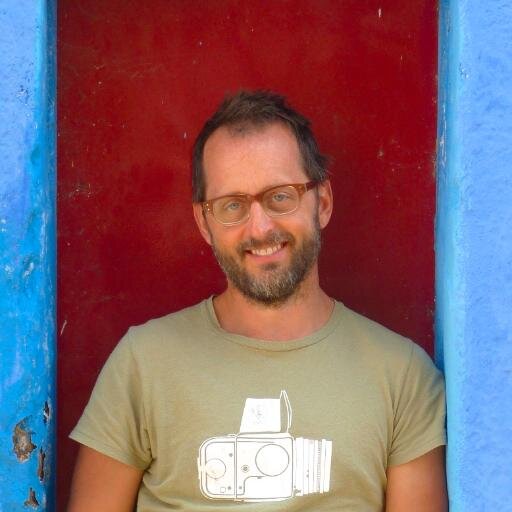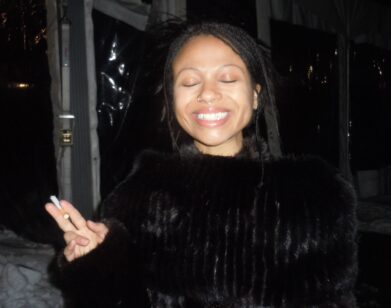Mike Harvkey’s Clash Culture

ABOVE: MIKE HARVKEY
The world is a violent place. In Mike Harvkey’s stark, startling debut novel In The Course of Human Events (Soft Skull), brutality reigns in a bleak but beautiful and often darkly funny Middle America. Protagonist Clyde Twitty’s future has been ripped away from him. Still a young man with vague, aching ambitions, Clyde has lost his factory job, lives with his mother, and barely scrapes by on a pathetic Walmart paycheck. Yet all this changes when Clyde meets the charming and charismatic Jay. An older man with a big-bosomed wife and precociously sexy teen daughter, Jay takes Clyde under his wing. But what begins as karate training under Jay’s idiosyncratic and often bloody instruction escalates into a violent nightmare that catapults Clyde into a dark, scary America. Harvkey has tapped into our subconscious and created a landscape that is modern, masochistic and seductive—scary because it is all too real. The economic collapse, the hustling just to get by, the desperation and longing for some greater purpose are things we can all relate to. Harvkey’s characters are sad, funny, shand bold because they are familiar; yet foreign, too, in their wild, ridiculous, terrifying schemes. We spoke with Harvkey about how emotions impact physicality, karate, 9/11, monster trucks, charming sociopaths and freedom.
ROYAL YOUNG: What happens when our future is taken away from us?
MIKE HARVKEY: Well, I think you get really pissed off. [laughs]
YOUNG: [laughs] To put it mildly.
HARVKEY: Yeah. Depending on the kind of person you are, that manifests itself quickly or through a slow burn. It takes time and possibly someone else’s inspiration to find an outlet. Clyde, in my book, emotionally he’s a hundred miles away from the way I react to things, which is sort of delayed. Which is terrible. Something will happen and when the required reaction is immediate instead being a product of the Midwest and my laconic father, I don’t deal with it immediately.
YOUNG: So that lets it build inside you?
HARVKEY: Yes and for me, it manifests physically and in my sleep. It’s really not pleasant.
YOUNG: It’s crazy how emotions have such a direct impact on your physicality.
HARVKEY: That’s essentially why I started training karate—I mean, I also got my ass kicked when I was a kid. But in a sense it was to try and change the way I deal with conflict situations, that’s what drove me into martial arts. But I’m curious about a lot of America and how they deal with their future being taken away. I mean, we are talking the day after the Supreme Court took away any cap on campaign contribution.
YOUNG: For me, 9/11 and even a little before that event made Americans feel like we had no real control over our political world or our futures. Of course a reasonable reaction to that would be anger.
HARVKEY: Absolutely, and being in New York for 9/11 and the 10 years after, which included an economic collapse and this idea of the 99 percent versus the one percent, has led to this collective feeling we have no control over what happens to us. This last decade has created post-traumatic stress that is widespread and shared in the country.
YOUNG: For me as a New Yorker, your picture of the Southern Midwest felt so exotic. I’ve never been and it made me really curious how all these events impacted that world.
HARVKEY: I remember soon after 9/11, I have a lot of family in Missouri and I was getting emails. New Yorkers kind of roll with things. But some of the reaction in the Midwest was much more fervent and afraid.
YOUNG: That always annoyed me so much.
HARVKEY: I know. Me too.
YOUNG: It was like, no one wants to fucking blow up your town. No one. [laughs]
HARVKEY: [laughs] Exactly. No one is going to lay waste to rural Missouri. So there was this email floating around after, and the subject was “Bitchin’ 9/11 truck.” This encapsulates the Midwest perfectly. It was a big, jacked-up four-by-four, and in homage to 9/11 it got a paint job that had every single victim’s name on it. There were also these action figures of police and firefighters and all my cousins in Missouri were playing with them rather solemnly in some sort of lesson about what could happen to our freedom.
YOUNG: That’s intense. What’s the charm of violence, brutality, and the people who practice it?
HARVKEY: I’ve been lucky or unlucky enough to come into contact with some people who fall into that category. Even functional brutality, like karate, I’ve been training since I was 16. There’s something very seductive about power and strength and someone who doesn’t give a shit about the rules, what anyone thinks or even their own well-being. There is an incredible lure to self-destructive people. Growing up in the rural Midwest in the ’80s and ’90s when crystal meth was becoming an epidemic and training karate with questionably violent men, it gave me a lot of material.
YOUNG: What’s interesting to me about these leaders or brilliant psychopaths is there’s a disregard for our social contract and normal human rules, but they have their own crazy, psychotic, specific to-the-letter rules that they expect all their followers to adhere to. That always kind of bugged me, like, okay, we’re just going to follow your set of violent rules. You also want to be the boss. [laughs]
HARVKEY: [laughs] Yeah, it’s hypocritical. But for some reason it always seems to go that way. Like it seems incredibly easy to amass followers.
YOUNG: We should start collecting some.
HARVKEY: Sometimes I think I should.
YOUNG: I guess you are kind of doing it by publishing a book. This is your beginning. [laughs]
HARVKEY: This is the manifesto. [laughs] Next I bring everyone to my compound. I just need to figure out where my compound is. But I did do research into cult leaders and the mechanics of radicalization. I did happen to know people who had been brought into cults, sects, or some radical form of martial arts. I’ve known people who trained karate with an instructor who demanded all the women in the class stop sleeping with their boyfriends or husbands and only sleep with him.
YOUNG: That’s crazy.
HARVKEY: I know, and it worked for a while. These things always only work for a while. The hypocrisy of the situation is interesting, because you are convincing people to reject all our social morals and accept theirs without question. I’m fascinated by people who would be open to radicalization in any way.
YOUNG: Do you think it can take lesser forms, too?
HARVKEY: Yeah, I think we’re always negotiating power dynamics. Not only is there something seductive about the powerful and strong, there is something equally seductive about having your needs taken care of by someone else. Not having to make any decisions, where you’re completely cared for but also subservient to someone else.
YOUNG: As Americans, we have so many options, but they’re empty ones. Like what kind of cell phone you want, all this social media, you can get 20 different types of coffee and 50 different kinds of cheese. But the bigger options like jobs, college, financial aid, buying houses, health care, those are not there.
HARVKEY: They’re dwindling very quickly.
YOUNG: What does freedom look like today?
HARVKEY: Freedom died with the economic collapse for most people. Freedom has been perverted into this capitalistic urge. Freedom used to be time. Time to be able to spend however you chose to spend it. We’re all working way too hard today and whatever free time we have left is being claimed by our devices and the millions of “choices” we have.
IN THE COURSE OF HUMAN EVENTS IS OUT TODAY.






